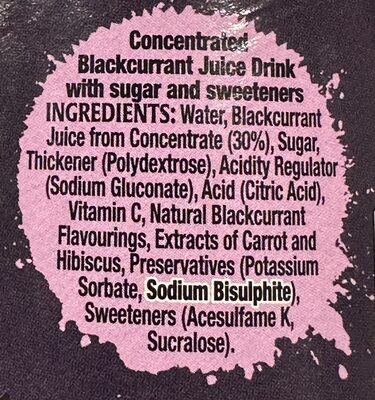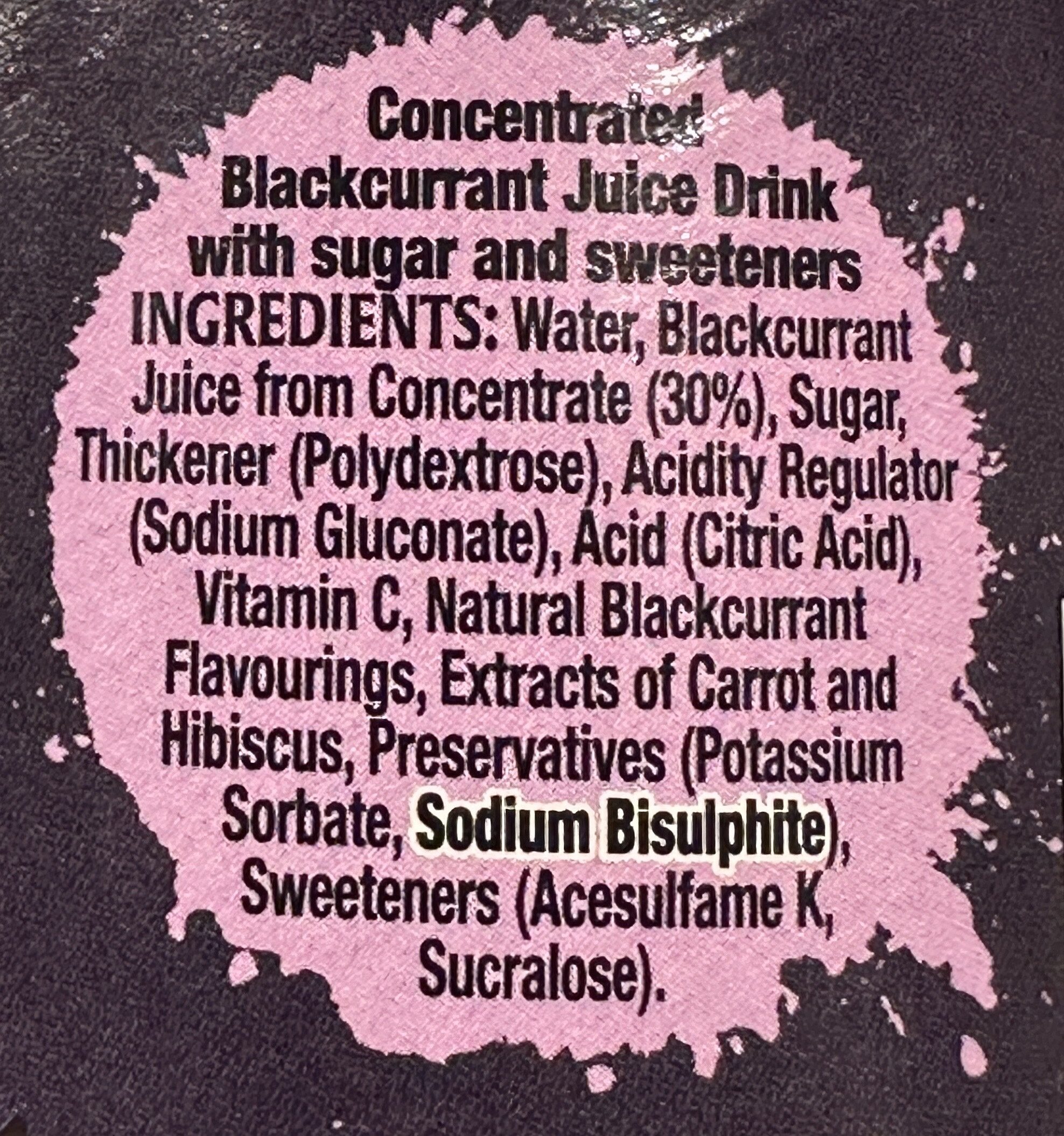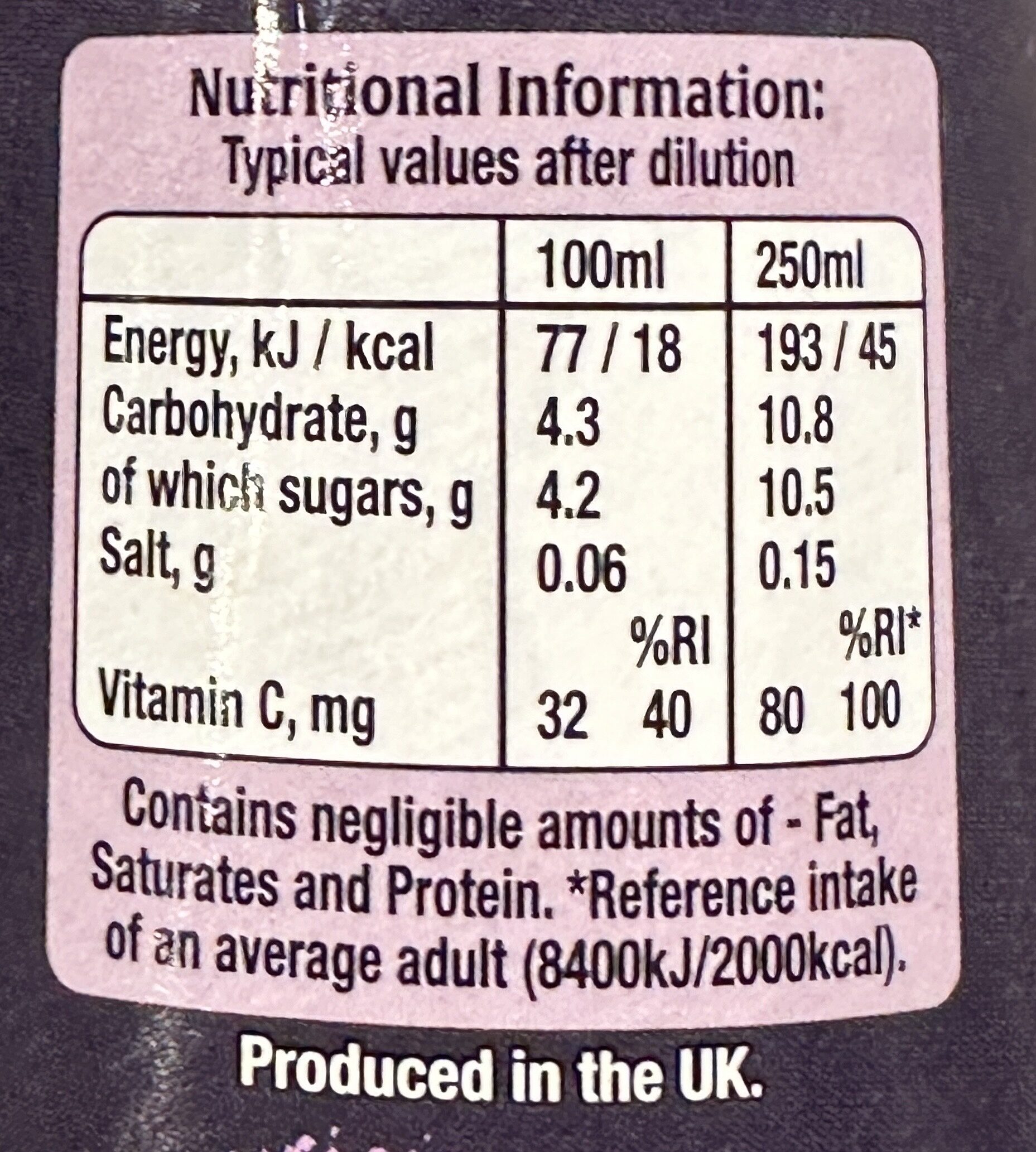Help us make food transparency the norm!
As a non-profit organization, we depend on your donations to continue informing consumers around the world about what they eat.
The food revolution starts with you!
Blackcurrant Squash - Ribena - 850ml
Blackcurrant Squash - Ribena - 850ml
This product page is not complete. You can help to complete it by editing it and adding more data from the photos we have, or by taking more photos using the app for Android or iPhone/iPad. Thank you!
×
Barcode: 5054267003378 (EAN / EAN-13)
Ainm coitianta: Ribena
Quantity: 850ml
Packaging: en:Bottle
Brandaí: Ribena
Catagóirí: en:Plant-based foods and beverages, en:Beverages, en:Plant-based beverages, en:Fruit-based beverages, en:Juices and nectars, en:Artificially sweetened beverages, en:Fruit juices, en:Blackcurrent juice drink
Link to the product page on the official site of the producer: https://www.ribena.co.uk/flavours/blackc...
Siopaí: Sainsbury's
Country: An Fhrainc, An Ríocht Aontaithe
Matching with your preferences
Health
Comhábhair
-
19 ingredients
An Béarla: Water, Blackcurrant Juice from Concentrate (30%), Sugar, Thickener (Polydextrose), Acidity Regulator (Sodium Gluconate), Acid (Citric Acid), Vitamin C, Natural Blackcurrant Flavourings, Extracts of Carrot and Hibiscus, Preservatives (Potassium Sorbate, Sodium Bisulphite), Sweeteners (Acesulfame K, Sucralose).
Food processing
-
Ultra processed foods
Elements that indicate the product is in the en:4 - Ultra processed food and drink products group:
- Additive: E950
- Additive: E955
- Comhábhar: Flavouring
- Comhábhar: Milseoir
- Comhábhar: Tiúsóir
Food products are classified into 4 groups according to their degree of processing:
- Unprocessed or minimally processed foods
- Processed culinary ingredients
- Processed foods
- Ultra processed foods
The determination of the group is based on the category of the product and on the ingredients it contains.
Additives
-
E1200
Polydextrose: Polydextrose is a synthetic polymer of glucose. It is a food ingredient classified as soluble fiber by the U.S. Food and Drug Administration -FDA- as well as Health Canada, as of April 2013. It is frequently used to increase the dietary fiber content of food, to replace sugar, and to reduce calories and fat content. It is a multi-purpose food ingredient synthesized from dextrose -glucose-, plus about 10 percent sorbitol and 1 percent citric acid. Its E number is E1200. The FDA approved it in 1981. It is 0.1 times as sweet as sugar.Source: Wikipedia (An Béarla)
-
E202
Potassium sorbate: Potassium sorbate is the potassium salt of sorbic acid, chemical formula CH3CH=CH−CH=CH−CO2K. It is a white salt that is very soluble in water -58.2% at 20 °C-. It is primarily used as a food preservative -E number 202-. Potassium sorbate is effective in a variety of applications including food, wine, and personal-care products. While sorbic acid is naturally occurring in some berries, virtually all of the world's production of sorbic acid, from which potassium sorbate is derived, is manufactured synthetically.Source: Wikipedia (An Béarla)
-
E222
Sodium bisulfite: Sodium bisulfite -or sodium bisulphite- -sodium hydrogen sulfite- is a chemical compound with the chemical formula NaHSO3. Sodium bisulfite is a food additive with E number E222. This salt of bisulfite can be prepared by bubbling sulfur dioxide in a solution of sodium carbonate in water. Sodium bisulfite in contact with chlorine bleach -aqueous solution of sodium hypochlorite- will generate heat and form sodium bisulfate and sodium chloride.Source: Wikipedia (An Béarla)
-
E330 - Aigéad citreach
Aigéad citreach: Aigéad carbocsaileach é an t-aigéad citreach HOOCCH2CHOH-COOH-CH2COOH. Tá sé le fáil go nádúrtha sa líomóid, san oráiste agus sna torthaí citris eile. Leasaitheach nádúrtha atá ann, agus cuirtear leis an mbia agus leis an deoch go minic é. Tá ról tábhachtach ag an aigéad citreach i meitibileacht na neach beo go léir, nó tá a leithéid ann agus timthriall an aigéid chitrigh. Timthriall d'imoibrithe ceimiceacha atá i gceist ina bhfuil an t-aigéad citreach ar ceann de na céimeanna, agus is cuid den ríospráid cheallach é - is é sin, an dóigh a mbíonn na cealla ag "análú" agus ag claochlú -ag dó- na saille agus na gcarbaihiodráití go dé-ocsaíd charbóin.Source: Wikipedia
-
E576
Sodium gluconate: Sodium gluconate is a compound with formula NaC6H11O7. It is the sodium salt of gluconic acid. Its E number is E576. Sodium gluconate is widely used in textile dyeing, printing and metal surface water treatment. It is also used as a chelating agent, a steel surface cleaning agent, a cleaning agent for glass bottles, and as a chelating agent for cement, plating and alumina dyeing industries. It is a white powder that is very soluble in water.Source: Wikipedia (An Béarla)
-
E950
Acesulfame potassium: Acesulfame potassium - AY-see-SUL-faym-, also known as acesulfame K -K is the symbol for potassium- or Ace K, is a calorie-free sugar substitute -artificial sweetener- often marketed under the trade names Sunett and Sweet One. In the European Union, it is known under the E number -additive code- E950. It was discovered accidentally in 1967 by German chemist Karl Clauss at Hoechst AG -now Nutrinova-. In chemical structure, acesulfame potassium is the potassium salt of 6-methyl-1‚2,3-oxathiazine-4-3H--one 2‚2-dioxide. It is a white crystalline powder with molecular formula C4H4KNO4S and a molecular weight of 201.24 g/mol.Source: Wikipedia (An Béarla)
-
E955
Sucralose: Sucralose is an artificial sweetener and sugar substitute. The majority of ingested sucralose is not broken down by the body, so it is noncaloric. In the European Union, it is also known under the E number E955. It is produced by chlorination of sucrose. Sucralose is about 320 to 1‚000 times sweeter than sucrose, three times as sweet as both aspartame and acesulfame potassium, and twice as sweet as sodium saccharin. Evidence of benefit is lacking for long-term weight loss with some data supporting weight gain and heart disease risks.It is stable under heat and over a broad range of pH conditions. Therefore, it can be used in baking or in products that require a long shelf life. The commercial success of sucralose-based products stems from its favorable comparison to other low-calorie sweeteners in terms of taste, stability, and safety. Common brand names of sucralose-based sweeteners are Splenda, Zerocal, Sukrana, SucraPlus, Candys, Cukren, and Nevella. Canderel Yellow also contains sucralose, but the original Canderel and Green Canderel do not.Source: Wikipedia (An Béarla)
Ingredients analysis
-
en:Palm oil free
No ingredients containing palm oil detected
-
en:Vegan status unknown
Unrecognized ingredients: en:Vitamin C
-
en:Vegetarian status unknown
Unrecognized ingredients: en:Vitamin C
-
Details of the analysis of the ingredients
en: Water, Blackcurrant Juice from Concentrate 30%, Sugar, Thickener (Polydextrose), Acidity Regulator (Sodium Gluconate), Acid (Citric Acid), Vitamin C, Natural Blackcurrant Flavourings, Carrot, Hibiscus, Preservatives (Potassium Sorbate, Sodium Bisulphite), Sweeteners (Acesulfame K, Sucralose)- Water -> en:water - vegan: yes - vegetarian: yes - ciqual_food_code: 18066 - percent_min: 30 - percent_max: 70
- Blackcurrant Juice from Concentrate -> en:blackcurrant-juice-from-concentrate - vegan: yes - vegetarian: yes - ciqual_food_code: 13007 - percent_min: 30 - percent: 30 - percent_max: 30
- Sugar -> en:sugar - vegan: yes - vegetarian: yes - ciqual_proxy_food_code: 31016 - percent_min: 0 - percent_max: 4.2
- Thickener -> en:thickener - percent_min: 0 - percent_max: 4.2
- Polydextrose -> en:e1200 - vegan: yes - vegetarian: yes - percent_min: 0 - percent_max: 4.2
- Acidity Regulator -> en:acidity-regulator - percent_min: 0 - percent_max: 4.2
- Sodium Gluconate -> en:e576 - vegan: yes - vegetarian: yes - percent_min: 0 - percent_max: 4.2
- Acid -> en:acid - percent_min: 0 - percent_max: 4.2
- Citric Acid -> en:e330 - vegan: yes - vegetarian: yes - percent_min: 0 - percent_max: 4.2
- Vitamin C -> en:vitamin-c - percent_min: 0 - percent_max: 4.2
- Natural Blackcurrant Flavourings -> en:natural-blackcurrant-flavouring - vegan: maybe - vegetarian: maybe - percent_min: 0 - percent_max: 4.2
- Carrot -> en:carrot - vegan: yes - vegetarian: yes - ciqual_food_code: 20009 - percent_min: 0 - percent_max: 4.2
- Hibiscus -> en:roselle-flower - vegan: yes - vegetarian: yes - percent_min: 0 - percent_max: 4.2
- Preservatives -> en:preservative - percent_min: 0 - percent_max: 4.2
- Potassium Sorbate -> en:e202 - vegan: yes - vegetarian: yes - percent_min: 0 - percent_max: 4.2
- Sodium Bisulphite -> en:e222 - vegan: yes - vegetarian: yes - percent_min: 0 - percent_max: 2.1
- Sweeteners -> en:sweetener - percent_min: 0 - percent_max: 4
- Acesulfame K -> en:e950 - vegan: yes - vegetarian: yes - percent_min: 0 - percent_max: 4
- Sucralose -> en:e955 - vegan: yes - vegetarian: yes - percent_min: 0 - percent_max: 2.1
Nutrition
-
Poor nutritional quality
⚠ ️Warning: the amount of fiber is not specified, their possible positive contribution to the grade could not be taken into account.⚠ ️Warning: the amount of fruits, vegetables and nuts is not specified on the label, it was estimated from the list of ingredients: 32This product is considered a beverage for the calculation of the Nutri-Score.
Positive points: 0
- Próitéiní: 0 / 5 (value: 0, rounded value: 0)
- Fiber: 0 / 5 (value: 0, rounded value: 0)
- Fruits, vegetables, nuts, and colza/walnut/olive oils: 0 / 10 (value: 32.1, rounded value: 32.1)
Negative points: 6
- Energy: 3 / 10 (value: 77, rounded value: 77)
- Siúcraí: 3 / 10 (value: 4.2, rounded value: 4.2)
- Saturated fat: 0 / 10 (value: 0, rounded value: 0)
- Sodium: 0 / 10 (value: 24, rounded value: 24)
The points for proteins are counted because the negative points are less than 11.
Nutritional score: (6 - 0)
Nutri-Score:
-
Nutrient levels
-
Saill as cainníocht íseal (0%)
What you need to know- A high consumption of fat, especially saturated fats, can raise cholesterol, which increases the risk of heart diseases.
Recommendation: Limit the consumption of fat and saturated fat- Choose products with lower fat and saturated fat content.
-
SáSitheáin saill as cainníocht íseal (0%)
What you need to know- A high consumption of fat, especially saturated fats, can raise cholesterol, which increases the risk of heart diseases.
Recommendation: Limit the consumption of fat and saturated fat- Choose products with lower fat and saturated fat content.
-
Siúcraí as moderate quantity (4.2%)
What you need to know- A high consumption of sugar can cause weight gain and tooth decay. It also augments the risk of type 2 diabetes and cardio-vascular diseases.
Recommendation: Limit the consumption of sugar and sugary drinks- Sugary drinks (such as sodas, fruit beverages, and fruit juices and nectars) should be limited as much as possible (no more than 1 glass a day).
- Choose products with lower sugar content and reduce the consumption of products with added sugars.
-
Salann as cainníocht íseal (0.06%)
What you need to know- A high consumption of salt (or sodium) can cause raised blood pressure, which can increase the risk of heart disease and stroke.
- Many people who have high blood pressure do not know it, as there are often no symptoms.
- Most people consume too much salt (on average 9 to 12 grams per day), around twice the recommended maximum level of intake.
Recommendation: Limit the consumption of salt and salted food- Reduce the quantity of salt used when cooking, and don't salt again at the table.
- Limit the consumption of salty snacks and choose products with lower salt content.
-
-
Nutrition facts
Nutrition facts As sold
for 100 g / 100 mlAs sold
per serving (50ml)Compared to: en:Artificially sweetened beverages Fuinneamh 77 kj
(18 kcal)38.5 kj
(9 kcal)+79% Saill 0 g 0 g -100% SáSitheáin saill 0 g 0 g -100% Carbaihiodráit 4.3 g 2.15 g +97% Siúcraí 4.2 g 2.1 g +137% Snáithín ? ? Próitéin 0 g 0 g -100% Salann 0.06 g 0.03 g +81% Vitimín C 32 mg 16 mg Fruits‚ vegetables‚ nuts and rapeseed‚ walnut and olive oils (estimate from ingredients list analysis) 32.1 % 32.1 %
Environment
-
Eco-Score E - Very high environmental impact
The Eco-Score is an experimental score that summarizes the environmental impacts of food products.→ The Eco-Score was initially developped for France and it is being extended to other European countries. The Eco-Score formula is subject to change as it is regularly improved to make it more precise and better suited to each country.Life cycle analysis
-
Average impact of products of the same category: D (Score: 24/100)
Catagóir: Mixed fruits juice, pure juice
Catagóir: Mixed fruits juice, pure juice
- PEF environmental score: 0.32 (the lower the score, the lower the impact)
- including impact on climate change: 0.91 kg CO2 eq/kg of product
Stage Impact Agriculture
80.8 %Processing
1.8 %Packaging
4.5 %Transportation
9.3 %Distribution
2.8 %Consumption
0.8 %
Bonuses and maluses
-
Missing origins of ingredients information
Malus: -5
⚠ ️ The origins of the ingredients of this product are not indicated.
If they are indicated on the packaging, you can modify the product sheet and add them.
If you are the manufacturer of this product, you can send us the information with our free platform for producers.
-
Packaging with a medium impact
Malus: -10
Shape Material Recycling Impact 1 Bottle Unknown Ard ⚠ ️ The information about the packaging of this product is not sufficiently precise (exact shapes and materials of all components of the packaging).⚠ ️ For a more precise calculation of the Eco-Score, you can modify the product page and add them.
If you are the manufacturer of this product, you can send us the information with our free platform for producers.
Eco-Score for this product
-
Impact for this product: E (Score: 9/100)
Táirge: Blackcurrant Squash - Ribena - 850ml
Life cycle analysis score: 24
Sum of bonuses and maluses: -15
Final score: 9/100
-
Carbon footprint
-
Equal to driving 0.5 km in a petrol car
91 g CO² per 100g of product
The carbon emission figure comes from ADEME's Agribalyse database, for the category: Mixed fruits juice, pure juice (Source: ADEME Agribalyse Database)
Stage Impact Agriculture
34.1 %Processing
9.7 %Packaging
16.3 %Transportation
35.3 %Distribution
3.9 %Consumption
0.7 %
Packaging
-
Packaging with a medium impact
-
Packaging parts
1 x Bottle
-
Packaging materials
Material % Packaging weight Packaging weight per 100 g of product
-
Transportation
-
Origins of ingredients
Missing origins of ingredients information
⚠ ️ The origins of the ingredients of this product are not indicated.
If they are indicated on the packaging, you can modify the product sheet and add them.
If you are the manufacturer of this product, you can send us the information with our free platform for producers.Add the origins of ingredients for this product Add the origins of ingredients for this product
Report a problem
-
Incomplete or incorrect information?
Category, labels, ingredients, allergens, nutritional information, photos etc.
If the information does not match the information on the packaging, please complete or correct it. Open Food Facts is a collaborative database, and every contribution is useful for all.
Data sources
Product added on ag openfoodfacts-contributors
Last edit of product page on ag ecoolmirocat.
Product page also edited by adamshort, aleene, emily2911, inf, packbot, ruperth, yuka.EapCEv_XMecuLvTO1NsX3gK2SvnDUs9AMkA3og, yuka.WDZZS0g3czluZGNybnRvUHhqL1o0UEZGeDV1NFRWeVZBUEVPSWc9PQ, yukafix.










